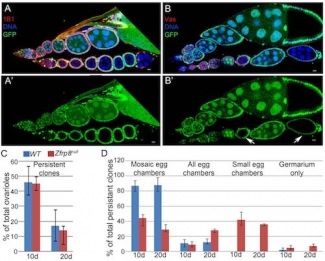Stem cells, Hematopoiesis, and Epigenetic Control of Chromatin Integrity in Drosophila
Zfrp8, a new gene functioning in stem cells and hematopoiesis in Drosophila
We have identified a new gene, Zfrp8 (PDCD2 in vertebrates) that regulates hematopoiesis in Drosophila. The Drosophila and human proteins are 38% identical. Several loss-of-function alleles of Zfrp8 cause enormous hyperplasia of the hematopoietic organs, the lymph glands, abnormal differentiation of immature blood cells, and severe growth delay in other tissues. The size of the lymph gland is already double that of wild type in late embryos. We have shown that the gene has a function in the regulation of the cell cycle, rather than apoptosis, as proposed by others.
We find that normal lymph gland development is more closely related to hematopoiesis in vertebrates than previously thought and hence represents an excellent model to study differentiation of blood cells. Using clonal analysis we determined that lymph glands contain stem cells at the top of a lineage ultimately giving rise to the three distinct hemocytes. With the same approach we showed that Zfrp8/PDCD2 is essential for the maintenance of the stem cells. We have also established that Zfrp8/PDCD2 function is required in all stem cells investigated so far, namely ovary germline and somatic stem cells, as well as gut stem cells.
The function of PDCD2 in humans is unknown and to gain more insight we are collaborating with Dr. Dale Schaar from the Cancer Institute of New Jersey. We have recently determined that PDCD2 is expressed in hematopoietic stem or precursor cells. In bone marrow and white blood cells from leukemia patients we detect a significant increase of PDCD2 expression compared to normal bone marrow and white blood cells. We have gained approval of an IRB protocol that allows us to study PDCD2 levels in patients. We aim at possibly developing a new disease marker.
In a genetic modifier screen we identified ~12 genes that function in the lymph gland and hemocyte development. We have selected a three of these genes for further analysis.
We have isolated the Dlg5 (Disc large 5) protein as a Zfrp8 interactor in a yeast two-hybrid screen, and also as part of a Zfrp8 protein complex in tissue culture cells. So far we have ascertained that the gene functions in lymph gland development. Further experiments investigating the genetic interaction of dlg5 and Zfrp8 and defining the function of dlg5 in stem cells are under way. Mouse dgl5 controls asymmetric cell division in mouse kidneys and brains.
